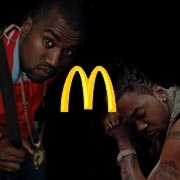You Deserve a Big Mac Record Deal Today
 You've heard them plug everything from Phat Farm and Seagrams to Curvoisier and Versace. Now, prepare for the Return of the Mac ... the Big Mac. Fast food giant McDonald's has partnered with a hip hop marketing firm to buy their way into the lyrics by some of your favorite
You've heard them plug everything from Phat Farm and Seagrams to Curvoisier and Versace. Now, prepare for the Return of the Mac ... the Big Mac. Fast food giant McDonald's has partnered with a hip hop marketing firm to buy their way into the lyrics by some of your favorite According to Advertising Age, the goal is to have several tracks hit the airwaves by the summer. Here's how it would work: the 'artists' have the freedom to create whatever
No money is paid up-front. In return for the placement, the fast food chain will pay rappers up to $5 every time a song mentioning the
Would You Like Fries with Those Lyrics?
Allegedly, the multinational food service corporation will have no involvement in writing the rhymes. That's hard to believe: the company is the global fast food leader and a marketing juggernaut. One would be hard-pressed to imagine that producers won't bounce ideas by McDonald's award-winning creative team. Truth be told, Mickey Dee's ad managers can probably develop better lyrics than Kanye or Jay-Z.

Hova is paid to mention Bentley. Busta Rhymes fronts an infommercial for Curvoisier, and their sales soar. Kanye plugs at least 19 brands and cries because he wasn't awarded enough Grammys for his (ahem) creativity. Yawn. This product placement is ridiculous. Mainstream hip hop lost credibility years ago, and the Big Mac attack is just an evolution of that mediocrity.
Super Size Me, Son
The blatant commercialization of hip hop discounts any notions of creative license or legitimacy. In today's ghetto-fab culture, money equals validation. As long as you're getting paid for something it must be okay, right?
Wrong. The McDonald's plan is a shameless ploy to market Big Macs to children and teens. Children are not aware that their favorite artists have morphed into walking and talking billboards. The average 13 year old does not read Ad Age or the Wall Street Journal; most teens and many young adults do not read newspapers.
McDonald's and other fast food chains have faced mounting criticism that they've helped fuel an obesity epidemic, particularly among children. The problem is even more apparent among minorities and the poor. One-third of black- and low-income children are obese, and the numbers are trending higher--and this would be intended audience for the Big Mac pimpin'. Mickey Dees and other food companies are paying lip service to responsible marketing, but it's apparent that this is just the latest gimmick in deceptive advertsing.
Years ago, rap music was called the 'CNN of the streets.' That may have been true in the golden years of hip hop in the 80s and early to mid 90s. Now, the music is more like a Home Shopping Network ... the poor man's version.
McDonald's Buying Its Way Into Hip Hop Lyrics: Ad Age
Return of the Mac Coming Soon: BBC
Big Mac Pimpin': MTV



